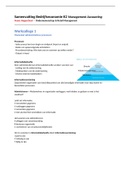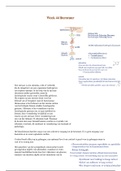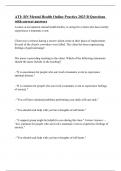Investments & Financial Assets
Essential nature of investment:
o Reduced current consumption
o Planned later consumption
Real Assets
o Assets used to produce goods and services (Land, Buildings, Machines)
Financial Assets
o Claims on real assets (Stocks, Bonds)
Financial Markets and the Economy
Informational role of financial markets
o Financial markets play a central rol in the allocation of capital resources
Consumption Timing
Allocation of Risks
Separation of Ownership and Management
o Agency issues (Corporate Governance and Corporate Ethics)
- Huge accounting scandals in the past (Enron, Royal Ahold, Bernard L.
Madoff Investment Securities LLC, Libor rate scandal)
- Auditing Scandals
- Analyst scandals: Favorable stock analysis in exchange fore for the
promise of future investment banking business
- Sarbanes-Oxley Act/Code Tabaksblat (Netherlands) – Tighten the rules
of corporate governance
Consumption Timing – Example
There are two periods and in each period I have an
income of $10,000, saving and borrowing is
possible at an interest rate of 5%
1. Consume $10,000 in both periods, consume
$10,000 in both periods
2. Save all money of the first period and
consume everything in the second period,
consume $0 in the first period and $10,000 x
1.05 + $10,000 = $20,500 in the second period
3. Consume everything now, consume $10,000 +
$10,000 /1.05 = $19,524 in the first period and
consume $0 in the second period
,Indifference Curves
The investor is indifferenct whether he obtains point A,
B or C along curve I1
All choices along I1 will be preferred to choices on I2
If you have not much to consume in period 1, extra
period 1 consumption requires larger efforts of period 2
consumption.
The steepness of the indifference curve for a given
person depends on the personal preferences – such as
risk-aversion
The Investment Process
Portfolio: Collection of Invesment Assets
o Asset allocation (choice among broad range of asset classes)
o Security selection (choice of securities within each asset class)
Security Analysis: valuation
o Top-down – asset allocation – pick securities
o Bottom-up – attractively priced securities, without much concern for asset
allocation
Markets are Competitive
Risk-Return Trade-Off
o Assets are priced in line with risks
Active Management
o Finding mispriced securities
o Timing the market
Passive Management
o No attempt to find undervalued securities
o No attempt to time the market
o Holding a highly diversified portfolio
o Trading costs/management fees are much lower
,The players
Firms – net borrowers
Households – net savers
Governments – can be both borrowers and savers
Financial intermediaries
o Investment companies
o Pension funds
o Banks
o Insurance companies
Invesment Banks
o Perform specialized services for businesses, for example IPO
o SEO/SPO
o Handles the marketing of securities in the primary market
Venture Capital – active role in the management of start-ups
Private Equity – investment in not publicly traded firms
Financial Markets
Money Markets – short term, liquid, low-risk
o T-Bills
o Certificates of Deposits
o Commercial paper
o Bankers’ acceptance
o Eurodollars
o Repurchase agreements
o Federal Funds
o Brokers’ Calls
o LIBOR and its replacements
o Bond Market – Longer term borrowing or debt instruments
Treasury notes and bonds
Municipal bonds
Corporate bonds
Mortgage securities
Federal agency debt
Capital Markets – longer term, more risky
o Common stock
Ownership share
1 share 1 vote
Board of directors, elected by shareholders (owners)
Residual claim – last in line on assets and income
Limited liability – max potential loss is original investment
Dividend yield
Capital gains
, o Preferred stock – features of equity and debt
Fixed amount of income
No voting power
Obligation to pay interest, but not dividend
Payments are treated as dividends, not tax-deductible for firm
o Derivative Assets – a claim whose value is contingent on the value of some
underlying asset
Options (call/put)
Right to buy or sell
Exercised only when profitable
Must be purchased
Futures
Obligation to make or take delivery
Obligation to buy/sell at futures price
Contracts are entered without costs
Lecture 2:
Chapter 3 How securities are traded
How firms issue securities
Firms can issue securities by borrowing money or selling shares
o Primary market – new issue of securities
o Secondary market – trading existing securities on exchanges or OTC markets
Both publicly listed firms and private corporations have shares, but the
first are traded publicly in markets, while the latter are held by a small
number of managers and investors
Publicly traded companies
IPO
o Road shows
o Bookbuilding
o Underwriters bears price risk
SEO
o Public offerings of stocks/bonds are marketed by underwriters








